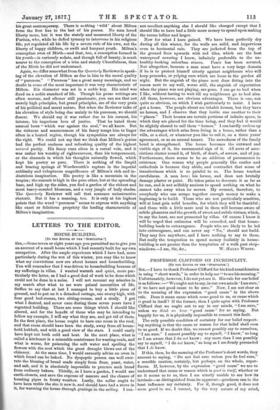LETTERS TO THE EDITOR.
HO USE -BUILDIN G.
[TO THE EDITOR OF THE " SPECTATOR."]
Sra,—Some seven or eight years ago you permitted me to give you an account of a small house which I had recently built for my own occupation. After the ample experience which I have bad, more particularly during the wet of this winter, you may like to know what my convictions now are about houses and housebuilding. You will remember that I was driven to housebuilding because of my sufferings in villas. I wanted warmth and quiet, more par- ticularly the latter, as I had a good deal of work to be done which could not be done in a noise. I will not recount my miseries in my search after what to me were primal necessities of life. Suffice to say that at last I managed to buy a little piece of 'ground, and to put on it a detached cottage, one storey high, with four good bed-rooms, two sitting-rooms, and a study. I got what I desired, and never once during these seven years have I regretted building. There are some things which I should like altered, and for the benefit of those who may be intending to follow my example, I will say what they are, and get rid of them. In the first place, the house ought to have one room in the roof, and that room should have been the study, away from all house- boldlubbub, and with a good view of the stars. I could easily have kept out both cold and heat. In the next place, what is carted a kitchener is a miserable contrivance for wasting coals, and what is worse, for poisoning the soft water and spoiling the flowers with the soot which the great draught blows out of the chimney. At the same time, I would earnestly advise an oven in which bread can be baked. No dyspeptic person can well over- rate the blessing of bread made simply from flour, yeast, water, and salt, and it is absolutely impossible to procure such bread from ordinary bakers. Thirdly, as I have a garden, 1 would use earth-closets, and save the expense of manure and the chance of bursting pipes in frosty weather. Lastly, the cellar ought to have been treble the size it now is, and should have had a stove in it, for warming the house through gratings in the ceiling. I can- not recollect anything else I should like changed except that I should like to have had a little more money to spend upon making the rooms loftier and larger.
Now for what I have gained. We have been perfectly dry during all this winter, for the walls are solid, and impervious even to horizontal rain. They are jacketed from the top of the ground floor upwards with red tiles, which are the best waterproof covering I know, infinitely preferable to the un- healthy-looking suburban stucco. Peace has been secured. Not altogether, because a man must have a very large domain if he is to protect himself utterly against neighbours who will keep peacocks, or yelping curs which are loose in the garden all night. But the anguish of the piano next door fitting into the recess next to my wall, worse still, the anguish of expectation when the piano was not playing, are gone. I can go to bed when I like, without having to wait till my neighbours go to bed also. All these, however, are obvious advantages. There is one, not quite so obvious, on which I wish particularly to insist. I have got a home. The people about me inhabit houses, but they have no homes, and I observe that they invite one another to their "places." Their houses are certain portions of infinite space, in which they are placed for the time being, and they feel it would be slightly absurd to call them "homes." I can hardly reckon up the advantages which arise from living in a home, rather than a villa, or a shed, or whatever you like to call it, on a three years' agreement, or as an annual tenant. The sacredness of the family bond is strengthened. The house becomes the outward and visible sign of it, the sacramental sign of it. All sorts of asso- ciations cluster round it, of birth, of death, of sorrow, and of joy. Furthermore, there seems to be an addition of permanence to existence. One reason why people generally like castles and cathedrals is because they abide, and contradict that sense of transitoriness which is so painful to us. The house teaches carefulness. A man love; his house, and does not brutally damage plaster or paint. He takes pains to decorate it as far as he can, and is not selfishly anxious to spend nothing on what he cannot take away when he moves. My counsel, therefore, to everybody who can scrape together enough money to make a beginning is to build. Those who are not particularly sensitive, will at least gain solid benefits, for which they will be thankful ; and those with a little more soul in them will become aware of subtle pleasures and the growth of sweet and subtle virtues, which, to say the least, are not promoted by villas. Of course I know it will be urged that estimates will be exceeded, and that house- building leads to extravagance. People who are likely to be led
into extravagance, and can never say "No," should not build. They may live anywhere, and I have nothing to say to them.
But really the temptation to spend money foolishly in house- building is not greater than the temptation of a walk past shop-


































 Previous page
Previous page